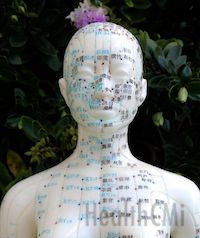A new study concludes that a combination of acupuncture and moxibustion for the treatment of insomnia is effective.  Researchers at the Henan University of Traditional Chinese Medicine compared two groups receiving acupuncture for the treatment of insomnia. Both groups were randomly assigned treatment regimes. Group A received acupuncture combined with moxibustion while group B received only acupuncture. Group A demonstrated over a ten percent increase in clinical efficacy for the treatment of insomnia over group B.
Researchers at the Henan University of Traditional Chinese Medicine compared two groups receiving acupuncture for the treatment of insomnia. Both groups were randomly assigned treatment regimes. Group A received acupuncture combined with moxibustion while group B received only acupuncture. Group A demonstrated over a ten percent increase in clinical efficacy for the treatment of insomnia over group B.
The study investigated a group of 120 patients suffering from insomnia divided into two groups. Group A received acupuncture at acupuncture points GV20 (Bai Hui), Sishencong (EX-HN1), UB62 (Shenmai) and KI6 (Zhaohai). Moxibustion was applied to GV20 and Sishencong. Group B received acupuncture at acupuncture points HT7 (Shenmen), PC6 (Neiguan) and SP6 (Sanyinjiao). Group A had a success rate of over 87% and group B had a success rate of over 76%. Across the board improvements included better sleep quality, better time to fall asleep and improved daytime function in the group receiving both acupuncture and moxibustion.
This study concurs with other recent research concluding that acupuncture is effective for improving sleep quality and emotional issues for patients with schizophrenia. Investigators concluded “that acupuncture has beneficial effects as a treatment for insomnia and psychopathology symptoms among patients with schizophrenia.” Another study confirms that acupuncture enhances slow wave sleep (SWS). Slow wave sleep, commonly referred to as deep sleep, is both the third and fourth stage of non-rapid eye movement sleep. Delta brain waves are dominant during SWS and deep sleep occurs in longer periods in the first three hours of sleep. Children tend to have longer periods of deep sleep while the elderly often experience nights without deep sleep. This research confirms that acupuncture improves the quality of deep sleep.
References:
Gao, Xiyan, Cuixiang Xu, Peiyu Wang, Shan Ren, Yanli Zhou, Xuguang Yang, and Ling Gao. "Curative effect of acupuncture and moxibustion on insomnia: a randomized clinical trial." Journal of Traditional Chinese Medicine 33, no. 4 (2013): 428-432.
Reshef, Alon, Boaz Bloch, Limor Vadas, Shai Ravid, Ilana Kremer, and Iris Haimov. "The Effects of Acupuncture Treatment on Sleep Quality and on Emotional Measures among Individuals Living with Schizophrenia: A Pilot Study." Sleep Disorders 2013 (2013).
Evidence-Based Complementary and Alternative Medicine. Volume 2012 (2012), Article ID 715024, 10 pages. doi:10.1155/2012/715024. Kappa-Opioid Receptors in the Caudal Nucleus Tractus Solitarius Mediate 100 Hz Electroacupuncture-Induced Sleep Activities in Rats. Chiung-Hsiang Cheng, Pei-Lu Yi, Han-Han Chang, Yi-Fong Tsai, and Fang-Chia Chang. National Taiwan University, Roosevelt Road, Taipei, Taiwan. Aletheia University, Matou Campus, Beishiliao, Tainan City, Taiwan. China Medical University, Taichung, Taiwan.

